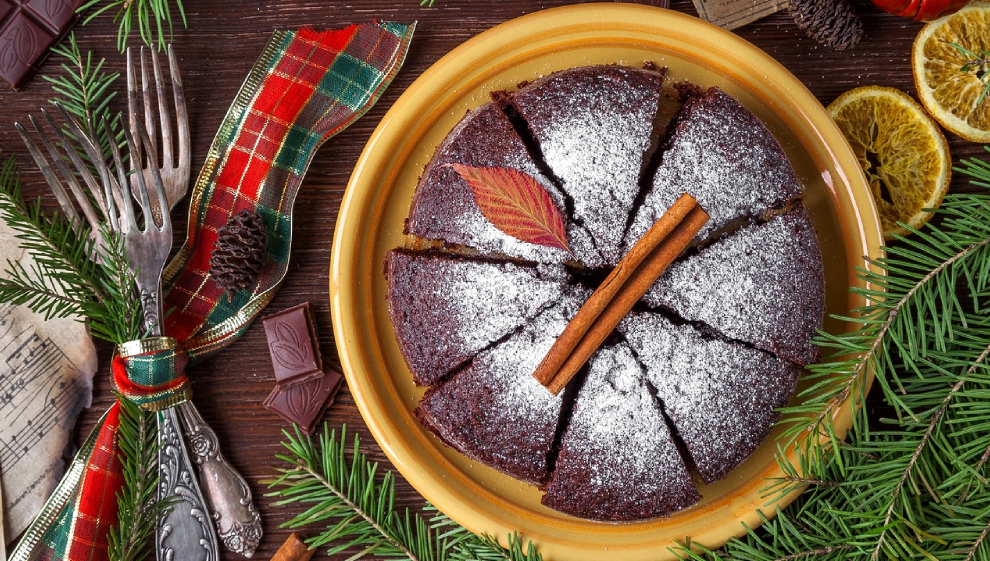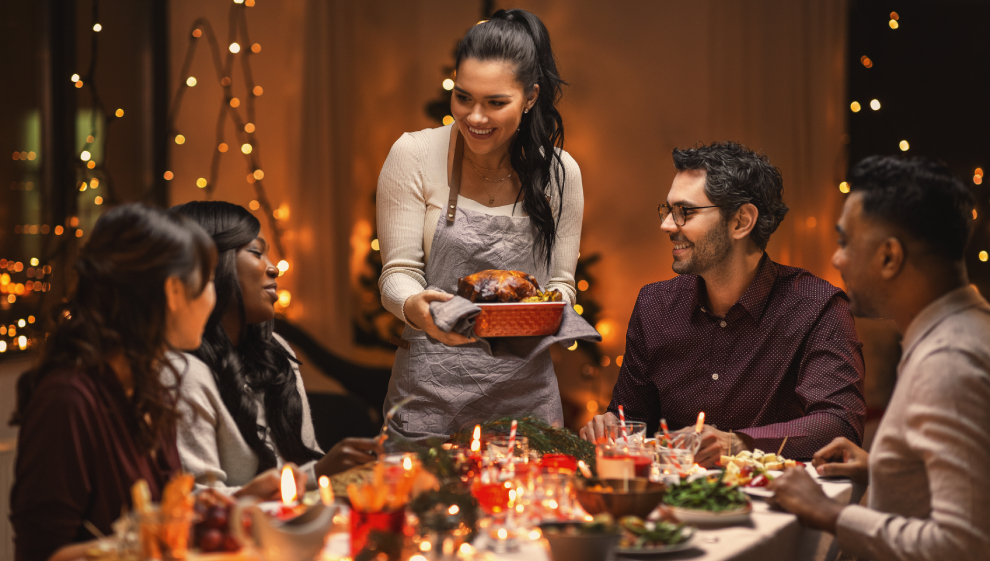10 top tips for mindful eating over the festive period
- Overview
- 1. Beware of the scarcity mindset
- 2. Give yourself permission to eat
- 3. Plan around your favourite foods
- 4. Remember the value of food
- 5. Listen to what your body is telling you
- 6. Slow things down
- 7. Avoid mindless eating
- 8. Add food, don’t take it away
- 9. Avoid all-or-nothing thinking
- 10. It’s not all about the food
- Related articles
Here are 6 tips for mindful eating over the Christmas period, from changing the way you think about indulging during the holidays, to savouring the moment you tuck into your festive treats.
1. Beware of the scarcity mindset
Foods that appear for what seems like a ‘limited’ time can really hook into our brains. Mince pies and other festive treats won’t be here forever, so we feel pressure to have them all right now.
However, in reality, we live with an abundance of good food available, and most of these ‘limited’ foods are actually available for a large part of the year.
The scarcity mindset makes us feel we must eat it if it’s there. See if you can approach the weekend with an abundance mindset and notice the difference it can make.
2. Give yourself permission to eat

We can create our own scarcity mindset if we go into the holidays thinking ‘I shouldn’t eat x,y or z’. Then, when we eat ‘x’, we can find ourselves overeating it, feeling guilty and then going around the whole cycle again.
Allow yourself to eat the foods you love – see what’s available and pause before you dive in to check what it is you really want. Don’t just be led by your eyes or mouth, which can take over when there's a variety of food around. What about the rest of you? What’s going to make you feel most satisfied?
3. Plan around your favourite foods
If there’s one food item you love eating on Christmas Day, incorporate it into your day in advance and adjust what you eat around it.
This reinforces the idea that we should be adding food, not taking it away. If there’s something you love to eat, eat it and restructure the rest of your day around this. If you love mince pies, you should eat them and adjust what you eat later in the day to accommodate your favourites.
You can easily structure these items into your day in a mindful and balanced way without going overboard or restricting yourself.
4. Remember the value of food
Remember that you do not need to exercise to deserve food. You are worthy of food as it is essential for keeping you alive regardless of what you are doing on a day-to-day basis.
You need food to function, and to keep your brain working and your muscles going. Do not deprive your body of what it needs. Treat your body with the kindness you would tell someone else to treat themselves with.
To eat mindfully is to understand your relationship with food and to eat in a way that doesn’t overindulge or deprive your body of what it needs to survive and operate correctly. At Christmas, remember and appreciate the value of food and why you need it in the first place.
5. Listen to what your body is telling you
Listen to when you are hungry and when you are full. A large part of mindful eating is knowing to eat when you are hungry and stop when you are full and satiated.
Try to be in tune with yourself and recognise these feelings. It may take you less or more time than someone else to feel full, so don’t compare your eating with others. There are many factors that determine how much food a person needs.
A good habit to get in is to spend time looking at your food rather than getting engrossed in a Christmas movie or conversation with someone whilst eating. Whilst community and socialising are a massive part of Christmas, it’s important we don’t eat mindlessly, as this can mean we lose appreciation for how good it tastes.
6. Slow things down

Whether it’s eating at a party or Christmas dinner with the family, try to slow down the whole eating process.
Aim to engage all of your senses and don’t take the next bite until you’ve finished the one in your mouth. This gives our bodies an opportunity to recognise when we are starting to feel full and the choice to stop before we feel uncomfortable.
7. Avoid mindless eating
Indulging in festive treats while you watch TV or a Christmas movie is pretty common. However, we all know how easy it is to find that our food has magically vanished before we know it.
Where possible, try and get the most out of these foods by eating them free of distractions and really concentrating on how they taste. Not only do we tend to eat less this way, but more importantly we also get to truly savour the food, helping us feel more satisfied.
If you can’t remove the distractions, try and portion out the food before you start eating it, so you don’t accidentally eat more than planned.
8. Add food, don’t take it away
Focus on addition rather than subtraction.
Think about what you can add to a meal to make a positive impact on your health rather than what you can take away.
For example, think about adding more vegetables to your Christmas Day meal rather than taking certain things out. If you love Christmas desserts, think about adding some berries to your dessert rather than avoiding the meal all together.
Food pairing benefits us in multiple ways. By adding healthy choices, you’re getting more nutrients, vitamins, and minerals without having to restrict or limit the foods you love most.
9. Avoid all-or-nothing thinking
If you've been making changes recently to live a healthier lifestyle, it can be common to feel anxious about celebrations ‘ruining’ all your hard work. People may be tempted to skip meals if they know they are potentially eating more later, or plan to ‘detox’ the following week.
Try to avoid these patterns of thinking and over-restricting and remember that holiday eating is a small part of our overall food intake. If you skip meals during the day, arriving at an event hungry makes it much harder to feel in control. And if you do find you overeat at a meal, try not to let this lead to further overeating later on.
10. It’s not all about the food

While food traditions and connections around food are such an important part of our lives, they aren’t the only things that can bring us joy over Christmas. Food and drink can be an easy option, but there is more to celebrating together on at holidays than just the food.
Consider how else you can treat and look after yourself over the festive period. Enjoy the time off and make the most of spending quality time with your loved ones.
Last updated Monday 4 December 2023
First published on Monday 11 April 2022

